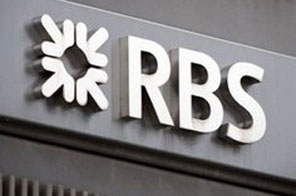British lender RBS posts loss, boss waives bonus
LONDON: Partly-nationalised Royal Bank of Scotland said Thursday that boss Stephen Hester waived his bonus due to public anger over the issue, adding that net losses narrowed last year to 3.6 billion pounds.
The loss, equivalent to 4.09 billion euros or 5.5 billion dollars, compared with a shortfall of 24.3 billion pounds in the previous year -- which was a record for a British listed company.
The group, which is now 84-percent government-owned after a series of huge bailouts, said impairment losses had likely peaked and it was making "good progress" on restructuring, but admitted the outlook remained "challenging".
RBS had decided to award Chief Executive Hester an annual bonus -- but he turned it down, like his counterparts at state-rescued Lloyds Banking Group and Barclays, which did not receive government cash.
"The board's remuneration committee considers that Stephen Hester significantly outperformed the targets he was set for 2009 and intended to award a bonus commensurate with that view," the bank said.
"He decided to waive this bonus award, given public controversy on banking pay and the potential for his bonus to divert attention from and weaken support for the RBS turnaround and recovery."
There is mounting public anger about banking sector bonuses, which some experts blame for encouraging the kind of excessive risk-taking that helped spark the global financial crisis and subsequent worldwide recession.
Meanwhile, the bank's 2009 performance beat market expectations for a net loss of 5.2 billion pounds, according to analysts polled by Dow Jones Newswires.
In reaction, RBS shares soared 7.83 percent to 39 pence in early deals on the London stock market, as investors welcomed the results.
"We are one year into our five-year turnaround plan and have taken significant steps along the path to recovery," said Hester in the earnings release.
"The strengths of our core business are becoming clearer, while the legacy of losses and exposures from the crisis is running off."
RBS said impairment losses rose sharply to 13.9 billion pounds last year, up from 7.4 billion pounds in 2008.
But it added: "Signs that impairments might have peaked appear to have been borne out in the fourth quarter, and there are indications that the pace of downwards credit rating migration for corporates is slowing."
RBS said it made "good progress" in a large restructuring plan that is aimed at steering RBS to profitability.
However, it warned that the outlook depended "on the shape and pace of economic recovery and the way it feeds through to business activity, interest rates and credit impairments".
RBS is now majority owned by the British state, which pumped billions of pounds into the crisis-hit group in the world's biggest banking bailout.
The troubled group was ravaged by the fierce global credit crunch and its takeover of Dutch bank giant ABN Amro at the top of the market in 2007 -- just before the financial crisis struck.
In contrast to the RBS loss, Barclays revealed last week that it more than doubled net profit in 2009 to almost 9.4 billion pounds, boosted by an asset sale, adding that its top executives would shun bonuses.
Barclays had said that its chief executive and president had declined a bonus for a second year running in the face of "intense public interest and concern."
And earlier this week, Britain's state-rescued Lloyds Banking Group said its chief executive Eric Daniels would not take his annual bonus of 2.3 million pounds.
LBG, which is 43-percent state owned after also being bailed out with billions of pounds, revealed the news ahead of its 2009 results which are due on Friday.






